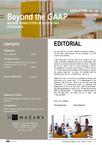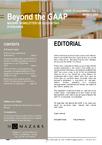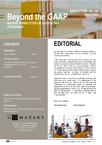Beyond the GAAP - March 2020 Issue
A few days later, with half the world’s population now under lock-down (whether enforced or encouraged), this month’s news has necessarily taken on a distinct flavour all its own. This is why we have produced a ‘COVID-19 supplement’ to examine the impacts of the crisis on 2019 reporting (for those entities still concerned!), and on the annual reporting that does not coincide with the calendar year and on the 2020 interim accounts.
While the crisis is absorbing a good deal of energy, the IASB has so far made only minor adjustments to its calendar and work plan. March, for example, saw the publication of a discussion paper on goodwill and impairment, to which we will return later in more detail. We also present the conclusions of the redeliberations on IFRS 17 amendments. The mandatory effective date of this standard has now been set at no later than 1 January 2023.
IFRS IC clarifies the treatment of training costs incurred to fulfil a contract with a customer
In March 2020, the IFRS Interpretations Committee (IFRS IC) reached a final decision on the question of how to account for training costs incurred by an entity that are necessary to fulfil a performance obligation to a customer. These are costs incurred when the staff providing the service must first be trained, for example in specific technical aspects of customer equipment that will be used.
In the Committee’s view, these costs are explicitly covered by IAS 38 on intangible assets, which states that they must be recognised as an expense when they are incurred. The IFRS IC also noted that IFRS 15 prohibits entities from capitalising the costs of fulfilling a contract where these are primarily within the scope of another standard that precludes their recognition as an asset.
Finally, the IFRS IC clarified that these costs are also immediately recognised as an expense when the contract explicitly permits the entity to charge them to the customer (as was the case in the fact pattern submitted to the Committee).
Discussion paper on goodwill and impairment
On 19 March, the IASB published a discussion paper on goodwill and impairment. Comments may be submitted no later than 15 September 2020 (unless the date is pushed back because of the COVID-19 outbreak).
This paper, which will be discussed in more detail in a future edition, presents the Board’s current thinking on the issues raised during the post-implementation review of IFRS 3 on business combinations. The paper includes:
- a section on improving disclosures about acquisitions: management’s objectives for the acquisition will in particular be disclosed in the year of acquisition. In subsequent financial periods, disclosures about how the acquisition has performed against those objectives will be provided;
- a section on the accounting for goodwill: as expected, at this stage the Board considers that goodwill should not be amortised (i.e. the impairment-only model should be retained). Nevertheless, proposals are being made for simplifying impairment tests and making them less costly, by providing relief from the requirement to perform a test annually if there is no indication that an impairment has occurred, and by simplifying the requirements for estimating value in use.
The IASB highlights the importance of this issue for stakeholders and encourages feedbacks concerning both disclosures and the accounting of goodwill.
The discussion paper can be found on the IASB site at:
IFRS taxonomy
On 17 March 2020, the IFRS Foundation published the IFRS Taxonomy 2020, which translates IFRSs into XBRL (eXtensible Business Reporting Language).
The IFRS taxonomy 2020 reflects the standards as published by the IASB at 1 January 2020, including those that are published but have not yet come into force.
Readers will note the importance of this taxonomy for European issuers, who have been required since 1 January 2020 to tag the consolidated IFRS accounts published in their annual financial reporting using iXBRL language. The taxonomy to be used (published by ESMA) is broadly inspired by the IASB taxonomy and is regularly updated to track the changes in the IFRS taxonomy.



